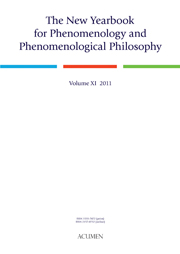Book contents
- Frontmatter
- Contents
- Articles
- Discussion
- Jacob Klein's Two Prescient Discoveries
- On the Mathematical Representation of Spacetime: A Case Study in Historical–Phenomenological Desedimentation
- Splitting the Movάς: Jacob Klein's Math Book reconsidered (Part I)
- History of Physics and the Thought of Jacob Klein
- Jacob Klein on the Dispute Between Plato and Aristotle Regarding Number
- Klein on Aristotle on Number
- The Philosophical Achievement of Jacob Klein
- In Review
- Conclusion
The Philosophical Achievement of Jacob Klein
from Discussion
- Frontmatter
- Contents
- Articles
- Discussion
- Jacob Klein's Two Prescient Discoveries
- On the Mathematical Representation of Spacetime: A Case Study in Historical–Phenomenological Desedimentation
- Splitting the Movάς: Jacob Klein's Math Book reconsidered (Part I)
- History of Physics and the Thought of Jacob Klein
- Jacob Klein on the Dispute Between Plato and Aristotle Regarding Number
- Klein on Aristotle on Number
- The Philosophical Achievement of Jacob Klein
- In Review
- Conclusion
Summary
Abstract: Jacob Klein's account of the original phenomenon of formalization accomplished by the innovators of modern mathematics, when they transformed the Greek arithmos into the modern concept of number, and his suggestion that the essential structure of this historically located formalization has become paradigmatic for the concept formation of non-mathematical concepts (and therefore the most salient characteristic of the “modern consciousness”), is situated within the context of Husserl's and Heidegger's understanding of formalization. I show that from the perspective of Klein's account of formalization the questions that inform Husserl's and Heidegger's phenomenological responses to the problem of formalization are derivative, insofar as both phenomenologists presuppose that the essence of formalization is something that is knowable independent of its historicity. I then show that Klein's philosophical achievement consists in his account of formalization and the formality of the concepts that it generates as being ungraspable so long as thinking approaches them as something is knowable, independent of its historicity.
Keywords: Jacob Klein; Edmund Husserl; Martin Heidegger; formalization; historicity; concept of number.
Part of the unique philosophical achievement of Jacob Klein is to have both thoroughly surpassed the understanding of his famous teachers Martin Heidegger and Edmund Husserl on important matters and to have remained, for the most part, as unknown in the “world” of the academy and beyond as his teachers, to this day, are known. Accounts by those who knew Klein attest that his lack of fame is not an accident.
- Type
- Chapter
- Information
- The New Yearbook for Phenomenology and Phenomenological PhilosophyVolume XI 2011, pp. 282 - 296Publisher: Acumen PublishingPrint publication year: 2012



